Arts & Entertainment
Family drama
Tender Roundhouse show well paced, acted
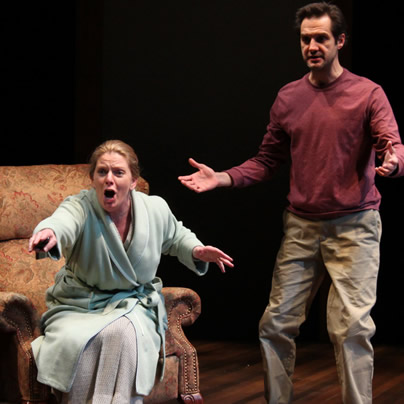
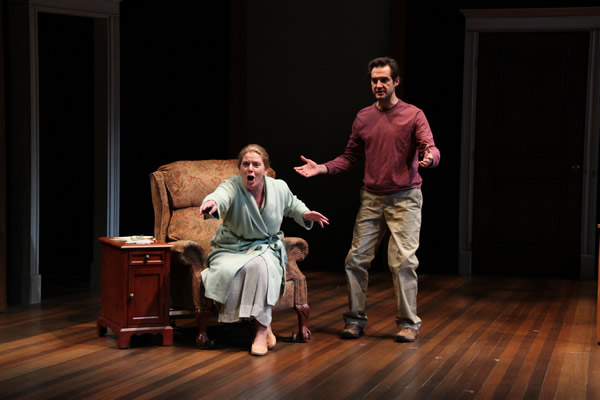
MaryBeth Wise as Mary and Ray Ficca as Bill in Roundhouse Theatre’s production of ‘How to Write a New Book for the Bible.’ (Photo by Danisha Crosby)
‘How to Write a New Book for the Bible’
Through May 5
Roundhouse Theatre
4545 East-West Highway, Bethesda
$10-$61
240-644-1100
roundhousetheatre.org
When his elderly mother Mary learns she has just six months to live, middle-aged Bill is forced to make a big decision: Go back to his life as a writer and Jesuit priest in the city or do what he thinks is the right thing — move in with mom and see her through to the end. Being the consummate dutiful son, Bill opts for the latter and during this cathartic time filled with scary pain, stretches of welcomed mundaneness and glimmers of joy, he grows even more appreciative of the stalwart mother he already loves.
In his latest work, the intensely autobiographical “How to Write a New Book for the Bible” (now at Roundhouse Theatre), playwright Bill Cain recounts the wide-ranging details of his 82-year-old mother’s death from liver cancer while also celebrating his life spent as the younger son in a mostly functional family.
The story takes place in Mary’s upstate New York apartment with frequent flashbacks 40 years prior to the Cain’s apartment in Queens. Speaking to the audience, Ray Ficca as Bill, warmly draws us into the world of his family, assuring everyone that the unfolding tale — at turns sentimental, funny, touching and occasionally starkly real (bring a hanky) — is true.
During development, the playwright dubbed this work “The Mom and Dad Play.” Yes, the lifelong love affair between sensible Mary (MaryBeth Wise) and her easier going spouse Pete (Mitchell Hébert) who could cut a rug and enjoyed a three scotch night out, is important to “Bible,” but a more apt working title might have been “The Cain Family Play.” In addition to the parents, both Bill (the play’s protagonist) and his older, athletic brother Paul (Danny Gavigan) are integral to the story. While Paul is deemed more physically capable by the parents, his clumsy but bright little brother Bill is still perceived as the favorite, setting the boys up for a mild, long ongoing rivalry. Nonetheless, the playwright’s respect and affection for his barely flawed characters is clear. Cain loves his family dearly.
Mary’s mantra is simple: life is tough, but if you work very hard it gets better. When Paul was a little boy he saved his pennies to buy a model from the hobby shop. At the register, he came up a nickel short. Mary refused to front him the five cents. She wanted to teach her son a lesson. She did — as soon as he comes of age, he’s off to Vietnam (a transformational military experience, compellingly played by Gavigan) and later raises a family faraway in Texas. But like all Cain family fights, Mary and Paul’s is eventually sorted out and put to rest.
Out actor MaryBeth Wise is extraordinary as Mary, fast forwarding 40 years, shifting from middle to late years, uncannily acquiring the rheumy eyes and slow gait that come with old age and sickness. As Bill, Ficca effectively portrays the frustrations and satisfactions concomitant with end-of-life caregiving. The remainder of the cast is equally good. Besides playing father and son, Hébert and Gavigan also effectively fill in as various annoying health professionals. Hébert additionally takes on a pair of smaller female roles, playing a recently bereaved hairstylist and Mary’s thoughtful, best friend Paulette.
With “Bible,” producing artistic director Ryan Rilette makes his Roundhouse directing debut. His smooth staging along with Daniel Conway’s deceptively simple, moving set; Colin K. Bills’ smart lighting design; and superb sound by Eric Shimelonis come together beautifully to support Cain’s time-travelling, quick scene-changing script.
Though Cain’s play is amusing and endearing, its center is about loss and pain. Ever the good son, Cain the playwright instructs that a bad situation can be made better- definitely a lesson worth sharing. His mother would be proud.
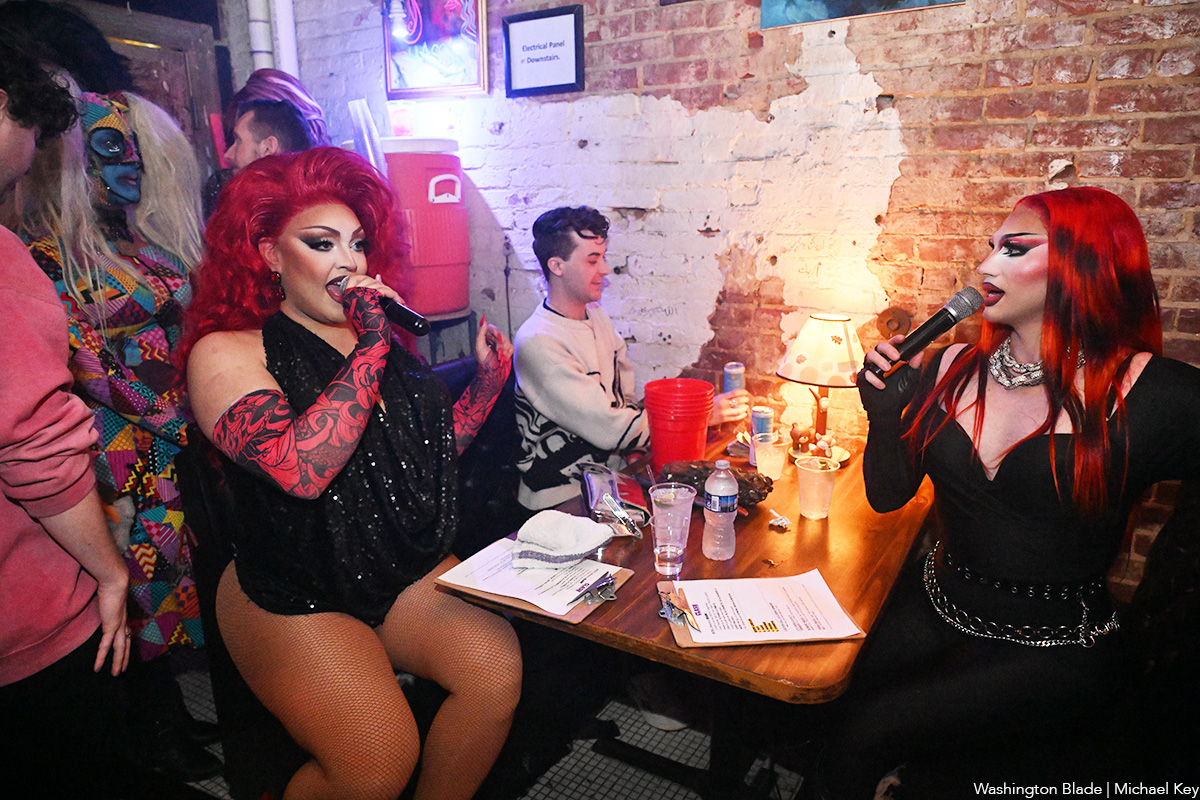
Crimsyn and Tatianna hosted the new weekly drag show Clash at Trade (1410 14th Street, N.W.) on Feb. 14, 2026. Performers included Aave, Crimsyn, Desiree Dik, and Tatianna.
(Washington Blade photos by Michael Key)
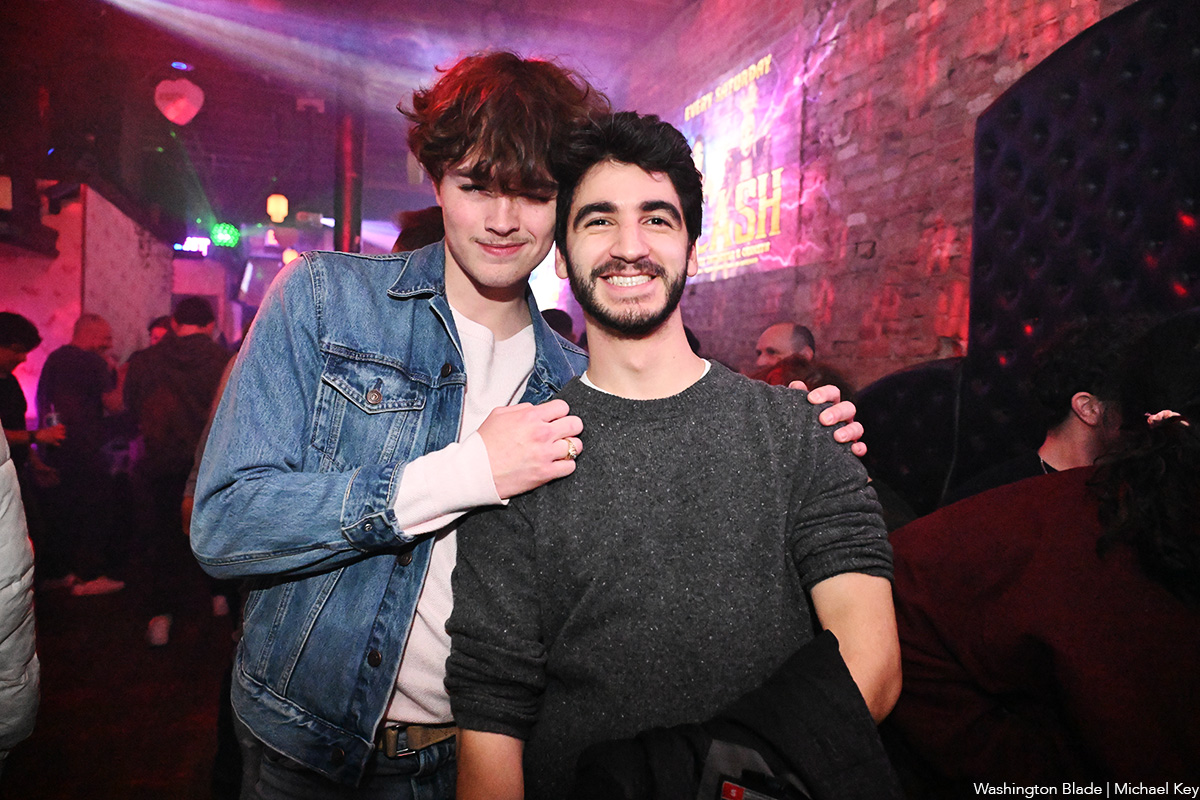
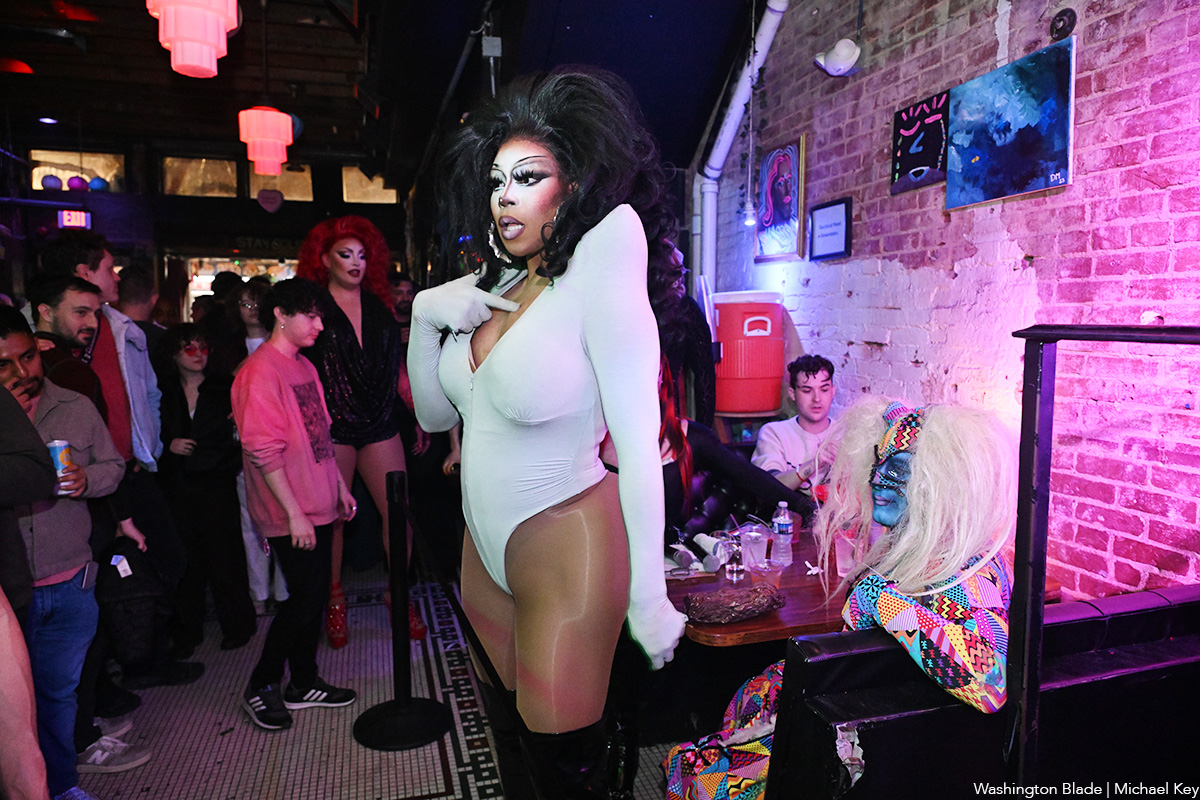
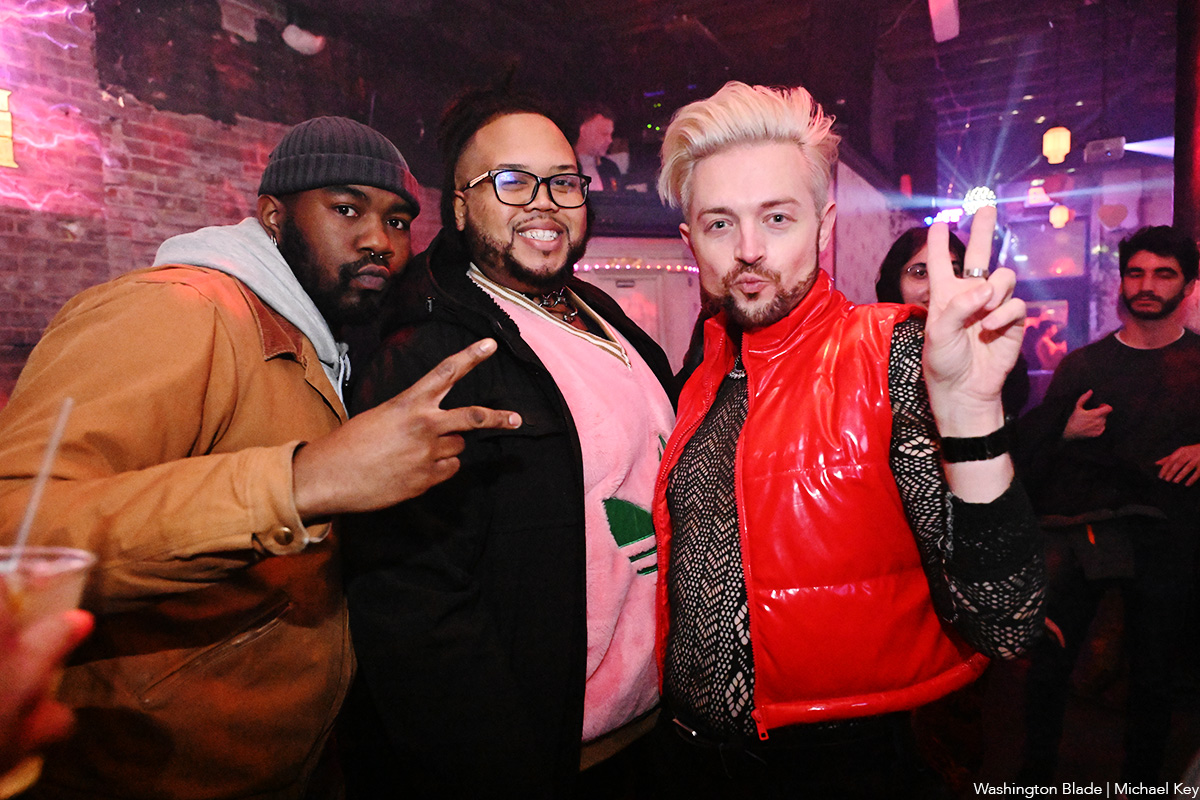
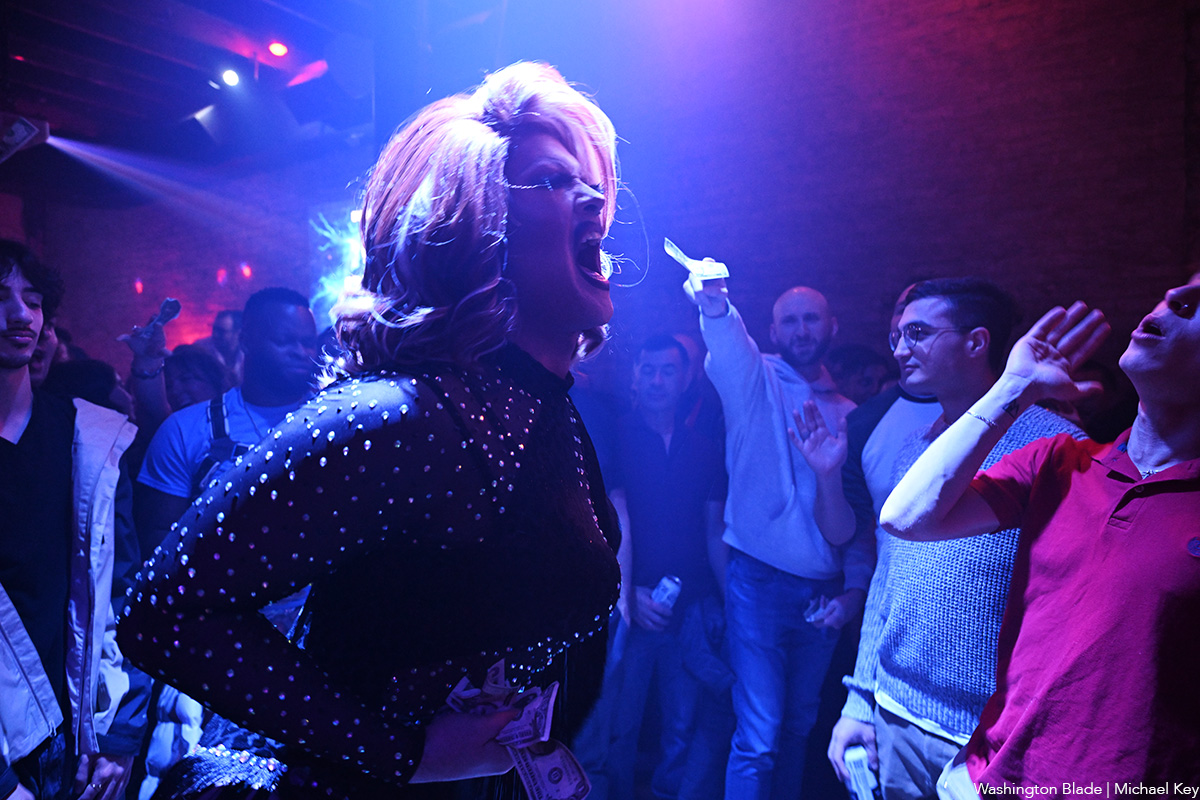

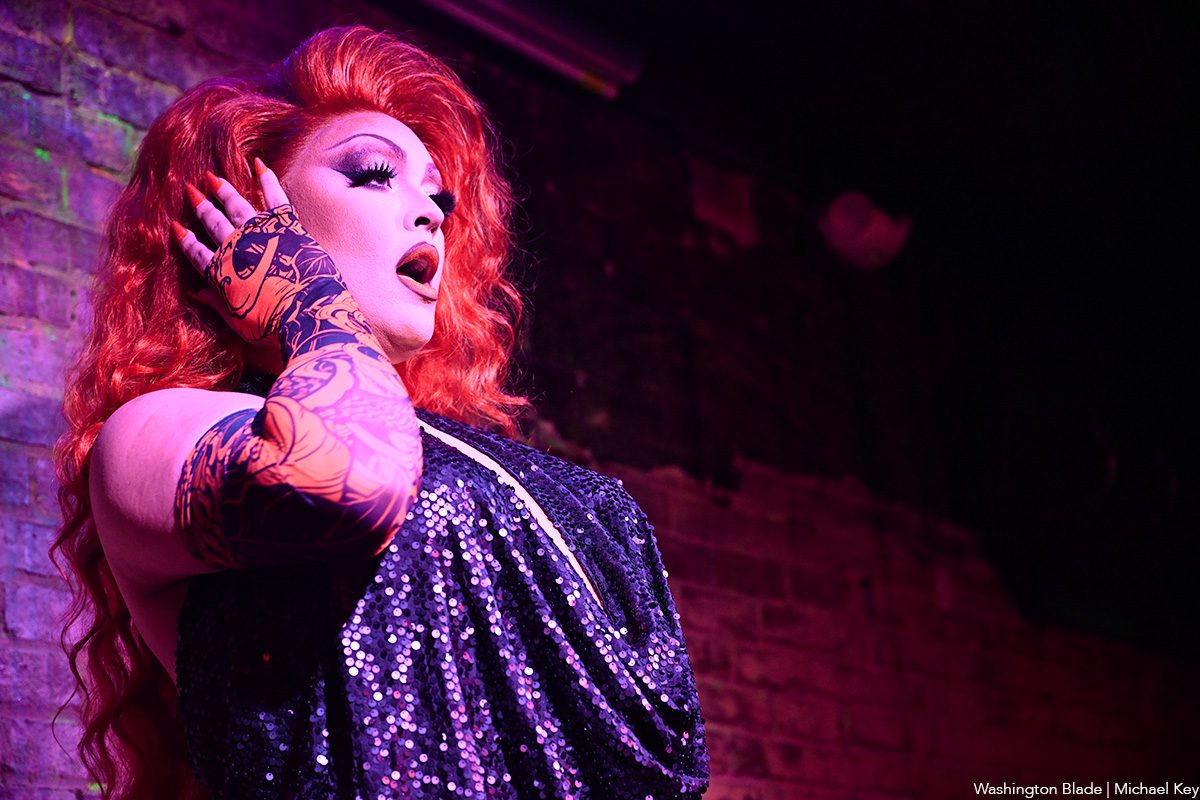
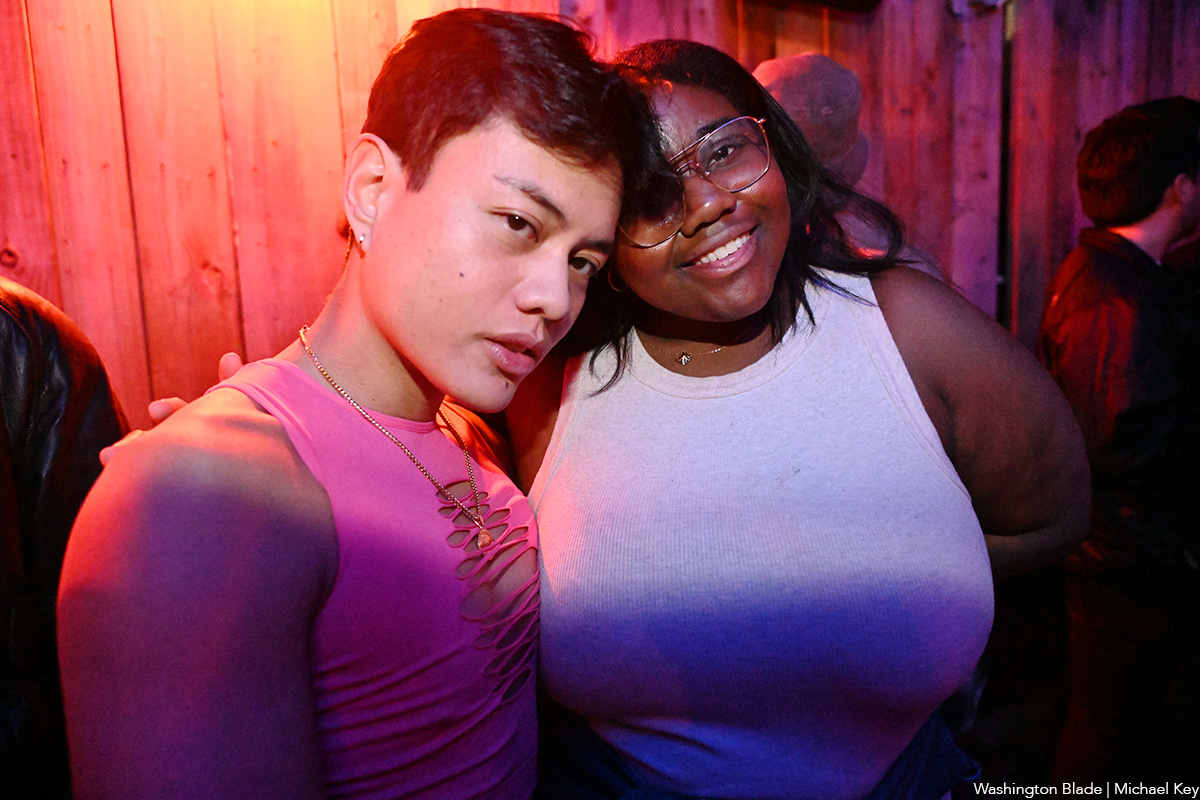
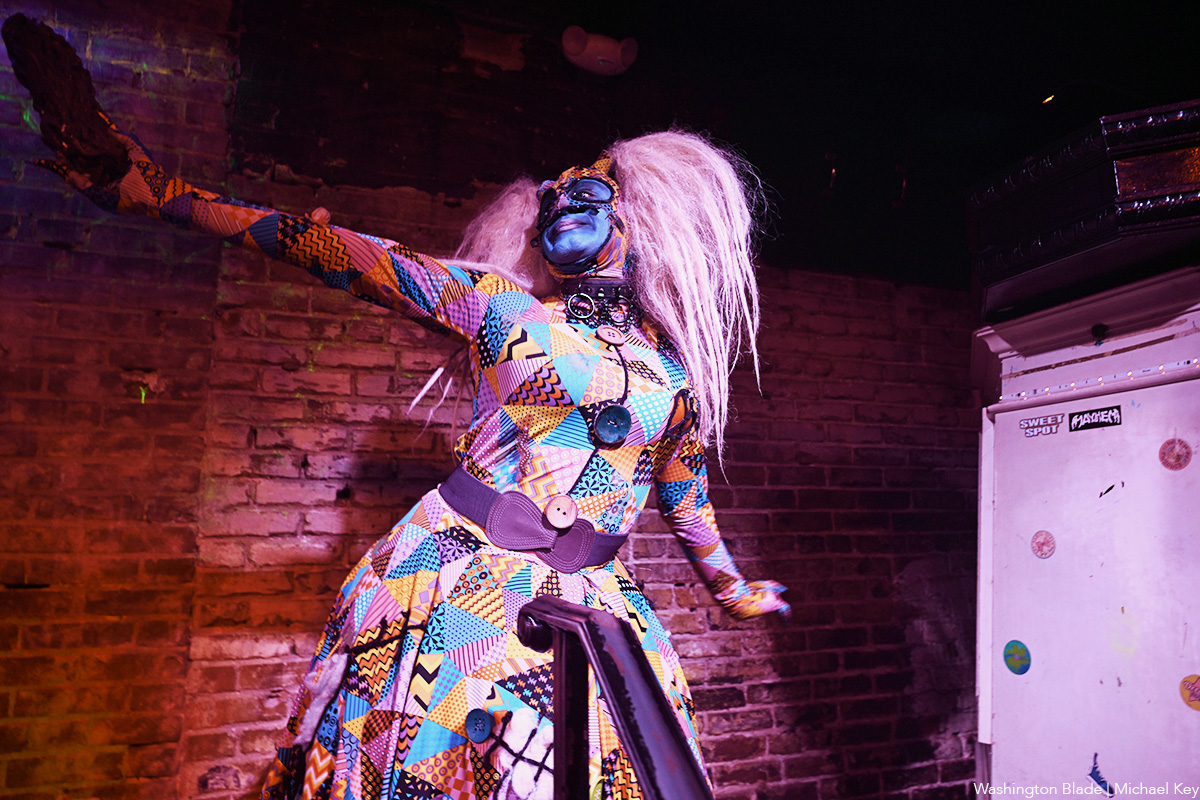

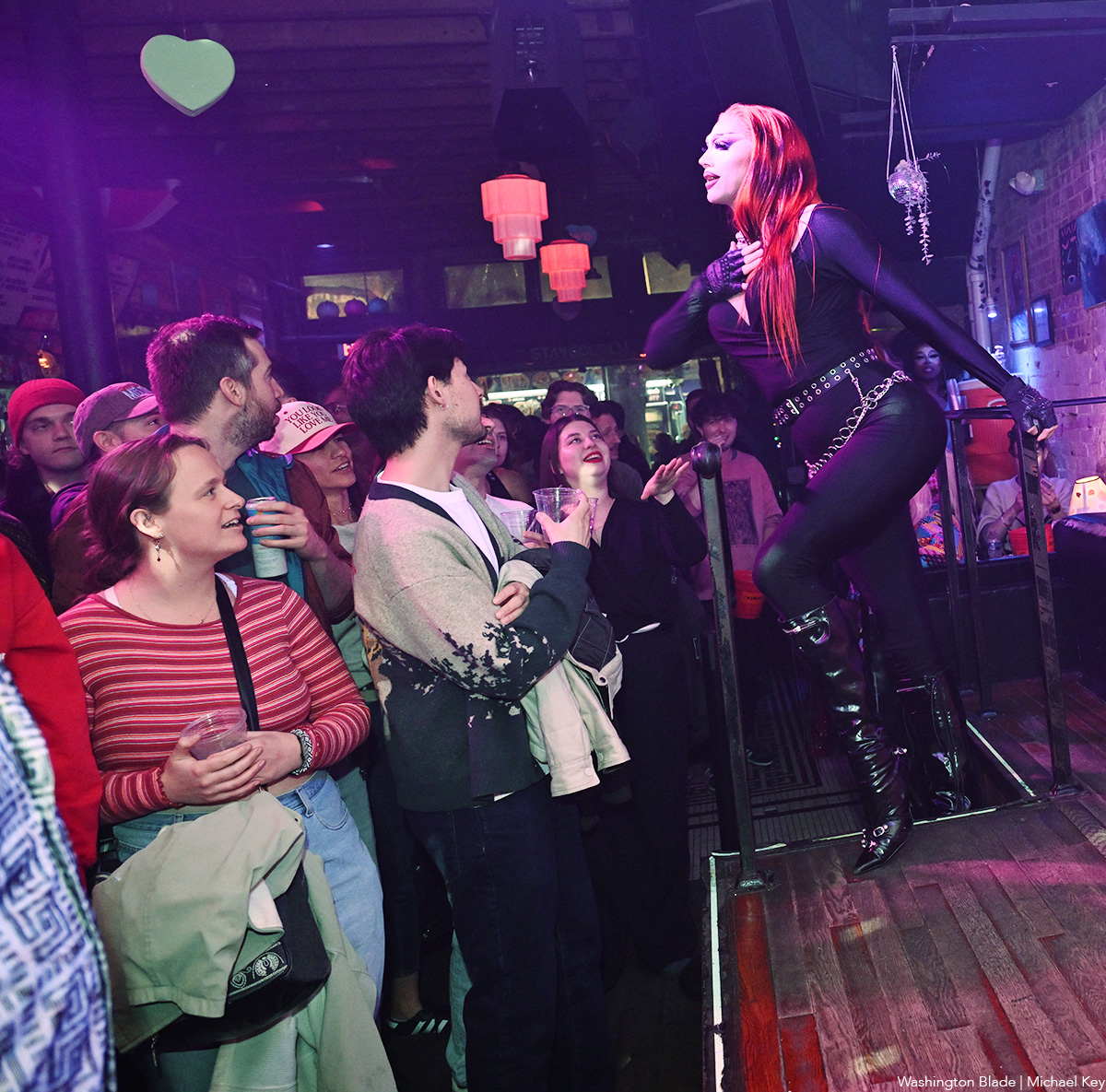

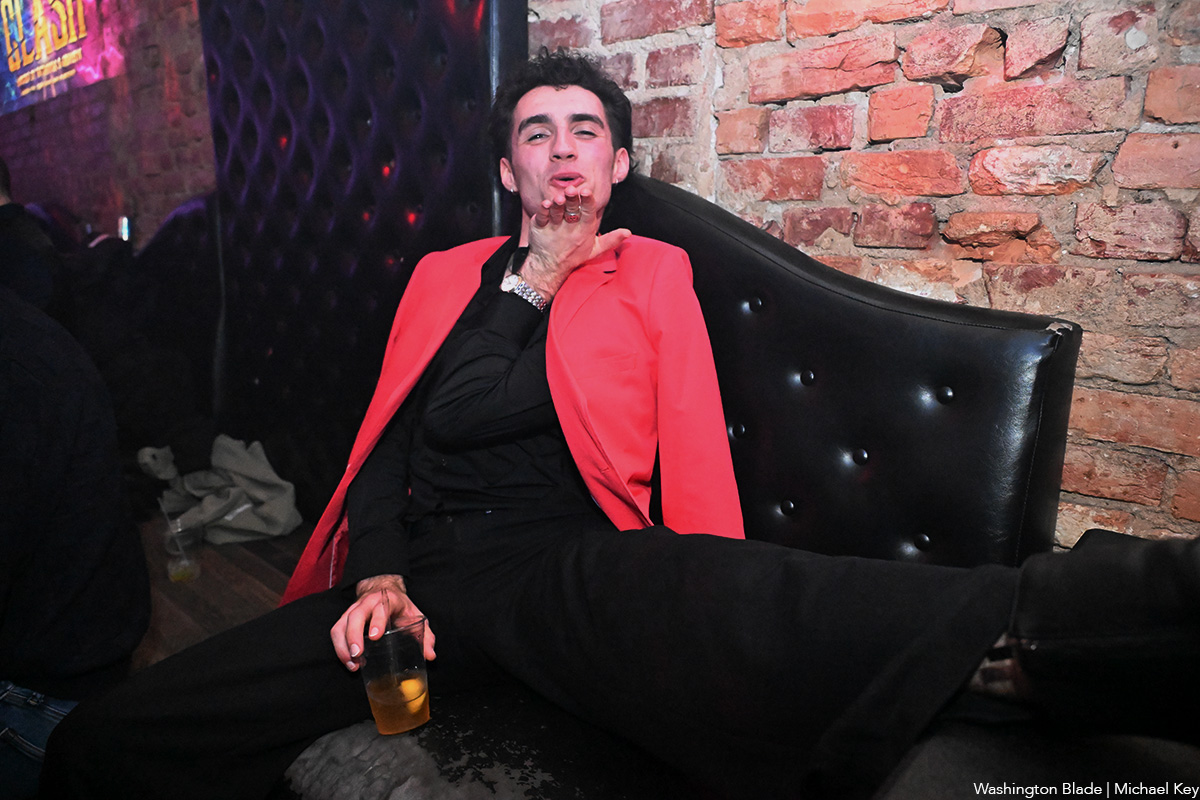
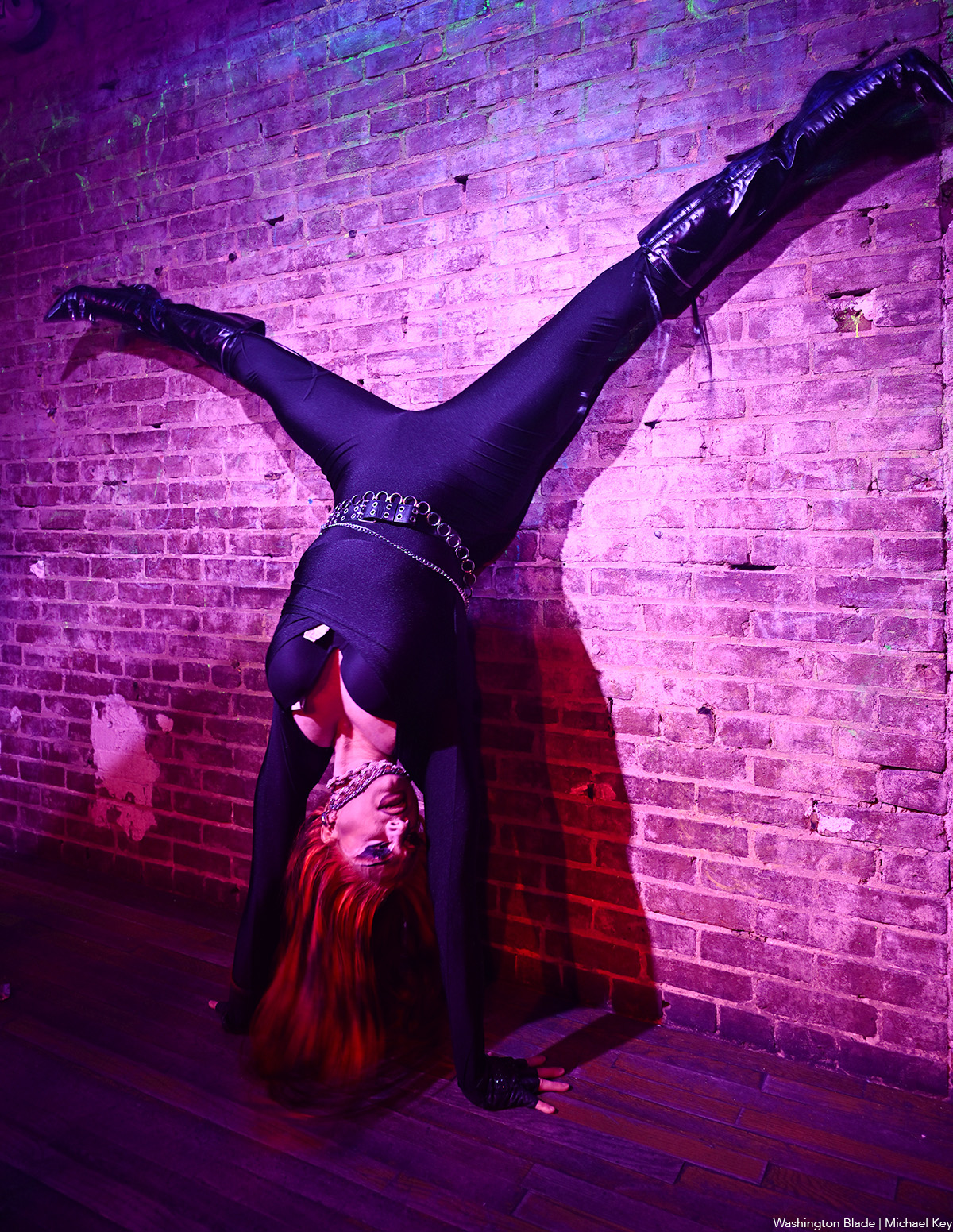
Theater
Magic is happening for Round House’s out stage manager
Carrie Edick talks long hours, intricacies of ‘Nothing Up My Sleeve’

‘Nothing Up My Sleeve’
Through March 15
Round House Theatre
4545 East-West Highway
Bethesda, Md. 20814
Tickets start at $50
Roundhousetheatre.org
Magic is happening for out stage manager Carrie Edick.
Working on Round House Theatre’s production of “Nothing Up My Sleeve,” Edick quickly learned the ways of magicians, their tricks, and all about the code of honor among those who are privy to their secrets.
The trick-filled, one-man show starring master illusionist Dendy and staged by celebrated director Aaron Posner, is part exciting magic act and part deeply personal journey. The new work promises “captivating storytelling, audience interaction, jaw-dropping tricks, and mind-bending surprises.”
Early in rehearsals, there was talk of signing a non-disclosure agreement (NDA) for production assistants. It didn’t happen, and it wasn’t necessary, explains Edick, 26. “By not having an NDA, Dendy shows a lot of trust in us, and that makes me want to keep the secrets even more.
“Magic is Dendy’s livelihood. He’s sharing a lot and trusting a lot; in return we do the best we can to support him and a large part of that includes keeping his secrets.”
As a production assistant (think assistant stage manager), Edick strives to make things move as smoothly as possible. While she acknowledges perfection is impossible and theater is about storytelling, her pursuit of exactness involves countless checklists and triple checks, again and again. Six day weeks and long hours are common. Stage managers are the first to arrive and last to leave.
This season has been a lot about learning, adds Edick. With “The Inheritance” at Round House (a 22-week long contract), she learned how to do a show in rep which meant changing from Part One to Part Two very quickly; “In Clay” at Signature Theatre introduced her to pottery; and now with “Nothing Up My Sleeve,” she’s undergoing a crash course in magic.
She compares her career to a never-ending education: “Stage managers possess a broad skillset and that makes us that much more malleable and ready to attack the next project. With some productions it hurts my heart a little bit to let it go, but usually I’m ready for something new.”
For Edick, theater is community. (Growing up in Maryland, she was a shy kid whose parents signed her up for theater classes.) Now that community is the DMV theater scene and she considers Round House her artistic home. It’s where she works in different capacities, and it’s the venue in which she and actor/playwright Olivia Luzquinos chose to be married in 2024.
Edick came out in middle school around the time of her bat mitzvah. It’s also around the same time she began stage managing. Throughout high school she was the resident stage manager for student productions, and also successfully participated in county and statewide stage management competitions which led to a scholarship at the University of Maryland, Baltimore County (UMBC) where she focused on technical theater studies.
Edick has always been clear about what she wants. At an early age she mapped out a theater trajectory. Her first professional gig was “Tuesdays with Morrie” at Theatre J in 2021. She’s worked consistently ever since.
Stage managing pays the bills but her resume also includes directing and intimacy choreography (a creative and technical process for creating physical and emotional intimacy on stage). She names Pulitzer Prize winning lesbian playwright Paula Vogel among her favorite artists, and places intimacy choreographing Vogel’s “How I learned to Drive” high on the artistic bucket list.
“To me that play is heightened art that has to do with a lot of triggering content that can be made very beautiful while being built to make you feel uncomfortable; it’s what I love about theater.”
For now, “Nothing Up My Sleeve” keeps Edick more than busy: “For one magic trick, we have to set up 100 needles.”
Ultimately, she says “For stage managers, the show should stay the same each night. What changes are audiences and the energy they bring.”

Friday, February 13
Center Aging Monthly Luncheon With Yoga will be at noon at the DC Center for the LGBT Community. Email Mac at [email protected] if you require ASL interpreter assistance, have any dietary restrictions, or questions about this event.
Go Gay DC will host “LGBTQ+ Community Happy Hour Meetup” at 7 p.m. at Freddie’s Beach Bar and Restaurant. This is a chance to relax, make new friends, and enjoy happy hour specials at this classic retro venue. Attendance is free and more details are available on Eventbrite.
Women in their Twenties and Thirties will be at 7 p.m. on Zoom. This is a social discussion group for queer women in the D.C. area. For more details, visit the group on Facebook.
Saturday, February 14
Go Gay DC will host “LGBTQ+ Community Brunch” at 11 a.m. at Freddie’s Beach Bar & Restaurant. This fun weekly event brings the DMV area LGBTQ community, including allies, together for delicious food and conversation. Attendance is free and more details are available on Eventbrite.
The DC Center for the LGBT Community will host a screening of “Love and Pride” at 1:30 p.m. This event is a joy-filled global streaming celebration honoring queer courage, Pride, and the power of love. It’s a bold celebration of courage and community — a fearless reminder of what we’ve overcome, how love is what makes us unstoppable, and how we have always turned fear into fierce. For more details, visit the Center’s website.
Sunday, February 15
LGBTQ+ Community Coffee and Conversation will be at 12 p.m. at As You Are. This event is for people looking to make more friends and meaningful connections in the LGBTQ community. Attendance is free and more details are available on Eventbrite.
Monday, February 16
Queer Book Club will be at 7:00p.m. on Zoom. This month’s read is “Faebound” by Saara El-Arifi. For more details, visit the DC Center’s website.
“Center Aging: Monday Coffee Klatch” will be at 10 a.m. on Zoom. This is a social hour for older LGBTQ+ adults. Guests are encouraged to bring a beverage of choice. For more information, contact Adam ([email protected]).
Tuesday, February 17
Center Bi+ Roundtable will be at 7 p.m. on Zoom. This is an opportunity for people to gather in order to discuss issues related to bisexuality or as Bi individuals in a private setting.Visit Facebook or Meetup for more information.
Wednesday, February 18
Job Club will be at 6 p.m. on Zoom upon request. This is a weekly job support program to help job entrants and seekers, including the long-term unemployed, improve self-confidence, motivation, resilience and productivity for effective job searches and networking — allowing participants to move away from being merely “applicants” toward being “candidates.” For more information, email [email protected] or visit thedccenter.org/careers.
Thursday, February 19
The DC Center’s Fresh Produce Program will be held all day at the DC Center for the LGBT Community. To be fair with who is receiving boxes, the program is moving to a lottery system. People will be informed on Wednesday at 5 p.m. if they are picked to receive a produce box. No proof of residency or income is required. For more information, email [email protected] or call 202-682-2245.
Virtual Yoga Class will be at 7 p.m. on Zoom. This free weekly class is a combination of yoga, breath work and meditation that allows LGBTQ+ community members to continue their healing journey with somatic and mindfulness practices. For more details, visit the DC Center’s website.

















